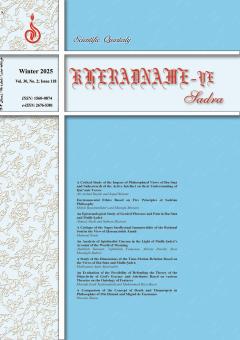A Critique of the Super Intellectual Immateriality of the Rational Soul in the View of Ḥassanzādeh Āmulī
Subject Areas : Studies on Mulla Sadra and the Transcendent Philosophy
1 - Associate Professor, Islamic Philosophy and Wisdom Department, Shahed University, Tehran, Iran
Keywords: super intellectual immateriality, Ḥassanzādeh Āmulī, rational soul, heart, trans-substantial motion,
Abstract :
The Problem of the super intellectual immateriality of the rational soul was posed by Ḥakīm Sabziwārī for the first time, and Ḥassanzādeh Āmulī discussed and investigated it extensively later. Apparently, the philosophers after him did not emulate his endeavors in this regard. The middle term of all the arguments presented by Ḥassanzādeh Āmulī to demonstrate the level of super intellectual immateriality is the rational soul’s being unlimited and possessing infinite levels. The most important argument in favor of this claim include: the rational soul’s lack of quiddity, its trans-substantial motion, its reaching the level of heart and perceiving the universals, and its shadow-like true and rightful unity. Ḥassanzādeh Āmulī also refers to some of the narrated ḥadiths and statements of certain prominent philosopher in order to prove his claim. The boundlessness of the rational soul does not mean its lacking quiddity because any existent except for the Necessary Being is limited and finite. Because of its trans-substantial motion, the moving distance of the rational soul can be divided into an infinite number of limits, which fails to demonstrate the super intellectual immateriality and boundlessness of the rational soul. Moreover, due to the intellectual restriction of human perceptions into three levels of sensory, imaginal, and intellectual types, the realization of the super intellectual immateriality of an ontological or perceptive level is impossible.
